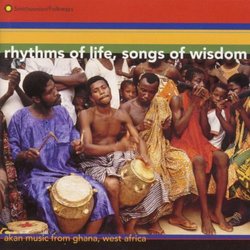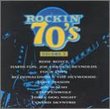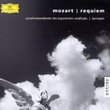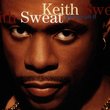| All Artists: Various Artists Title: Rhythms of Life Songs of Wisdom Members Wishing: 1 Total Copies: 0 Label: Smithsonian Folkways Original Release Date: 1/23/1996 Release Date: 1/23/1996 Genres: Blues, Folk, International Music, Special Interest, Pop, R&B Styles: Traditional Blues, Traditional Folk, Africa, Soul Number of Discs: 1 SwapaCD Credits: 1 UPC: 093074046326 |
Search - Various Artists :: Rhythms of Life Songs of Wisdom
 | Various Artists Rhythms of Life Songs of Wisdom Genres: Blues, Folk, International Music, Special Interest, Pop, R&B
This recording leaves the listener breathless and astounded by the musical richness of this small area of Africa. In these performances from remote areas of central Ghana, the collective musical genius of everyday farmers,... more » |
Larger Image |
CD DetailsSynopsis
Album Description This recording leaves the listener breathless and astounded by the musical richness of this small area of Africa. In these performances from remote areas of central Ghana, the collective musical genius of everyday farmers, fisher-folk, traders, and civil servants bursts forth. Their singing and chanting moves through a colorful palette of instruments including water drums, rectangular frame drums, side-blown horns, and brass bands. Clear, penetrating sounds of metal instruments offset by complex drumming patterns are framed by haunting vocals. Listeners are immersed in a kaleidoscope of sound. Thirteen tracks and 28 page booklet including extensive notes and photos. This is the only commercially available recording of Akan music. Similar CDs
|
CD ReviewsMore great music from Ghana. Pharoah S. Wail | Inner Space | 11/19/2004 (4 out of 5 stars) "This is a disc completely worthy of your money and time. In case you have family, historical, and/or geographical reasons for wanting to know, the music on this disc is from Ghana's Central Region (not actually in the center of Ghana though, "Central Region" is the name of... for lack of a better term... a state in Ghana). The music is by (and from their areas of the Central Region) Assin, Efutu, Denkyira, and Fante peoples. All are Akan groups except the Efutu, "whose languages belong to the Guan cluster of the Kwa branch". Obviously I got this from the liner-notes, as I am no expert on all the many... and there are MANY... different languages and cultures of Ghana. As for the music itself, I've had this disc for a couple weeks now and I'm loving it more with each listen. It is a very fine collection of recordings! I didn't get to the liner-notes until yesterday. It was interesting to find out that the Efutu are not Akan, since I had already noticed a distinct difference between the feel of their music and the other (although also differing) musics here. For those with some hip-hop interest, the Efutu track here makes me feel like they are playing some sort of ancient ancestor of a Timbaland beat. I like it alot. =) There is alot for which to be thankful on this disc, and if you've ever stumbled upon my reviews for a few other cds from Ghana (the Master Drummers of Dagbon 1 & 2, and the Master Fiddlers of Dagbon), you'll be interested in knowing that this disc is completely different from those. Unfortunately, oftentimes things are lumped under the monolithic label of being "African music", but that is so broad as to be almost meaningless, considering the degree of musical diversity even in just one small country like Ghana. If you have the Masters discs I just mentioned, and you're worried about buying this one and feeling like it'd just be more of the same, don't worry. This is a whole other world. The singing here has a much more organized feel than that on the Masters discs. Also, this disc always has larger groups of singers. It is more of a central feature of the music as well. Some lovely "chorus" vocals, sometimes in the form of interplay with the drumming. What you'll think of the brass band tracks (just a couple), I do not know. I like them, but I'm a weirdo. The first one strikes me almost as William Parker-ish orchestrations of his interpretation of the timbre of a bleating goat. I mean that in a good way. Also the percussion on that track is fantastic! I'm not sure how they are getting this tone, but it's like controlled, perfectly timed fireworks exploding in the distance. Rather than rambling further, I will wrap this up by saying you probably didn't stumble on this cd by accident, so this sort of thing already interests you. Go ahead and pick this one up because I'm sure you're going to love it. " 1979 field recordings from the Akan coastal areas of Ghana m_noland | Washington, DC United States | 03/09/2004 (4 out of 5 stars) "Field recordings of Akan folk music from the Central and Western Regions of Ghana made by ethnomusicologist Roger Vetter in 1979. In this respect the disk is more narrowly homogeneous than some similar ones: only the Central and Western Regions are represented, although the bulk of the Akan population of Ghana lives in the Ashanti and Eastern Regions. And, obviously, if it is a disk of Akan music, it does not include music produced by other ethnic groups in Ghana.What the disk lacks in geographical and ethnic diversity, it makes up in stylistic reach. The music in these recordings is played by non-professional and semi-professional players, and although most of the music is quite traditional (i.e. shows little European influence) some tracks include instruments that originated outside Africa such as the tuba or the electric guitar, and some of the repertoire including waltzes and gospel music show a Western influence transmogrified in the local milieu. In this regard the recordings are authentic: the variety of music produced for local performance and consumption in the Akan coastal regions of Ghana was (and remains) varied, reflecting a variety of cultural uses and influences. While most of the music on this disk was meant for dancing, one of the most interesting tracks is a talking drum piece in which the message is not only played but recited, allowing one to hear the translation from speech to drumming. The accompanying booklet documenting the cultural background, the players, their instruments, and the various musical styles is highly informative."
|

 Track Listings (13) - Disc #1
Track Listings (13) - Disc #1


